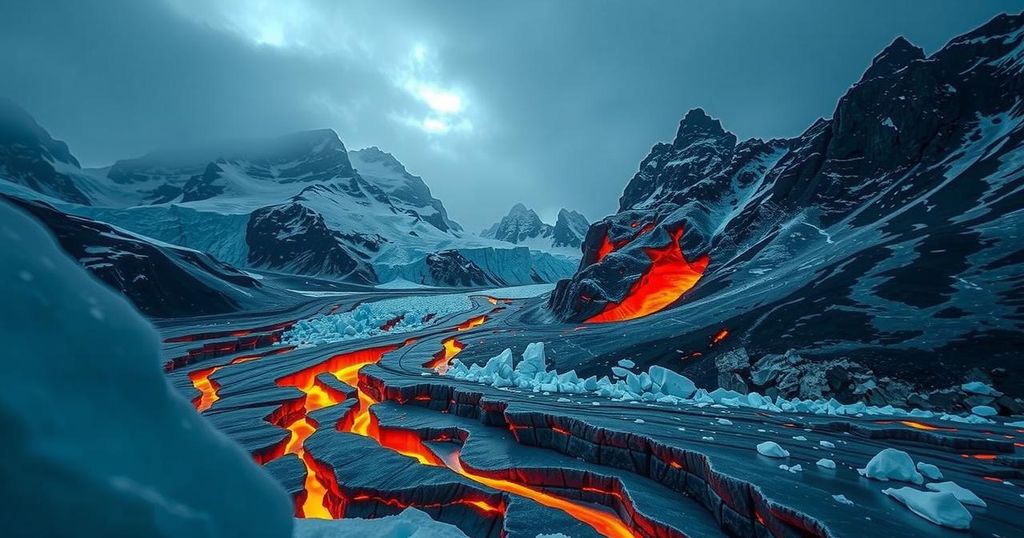Scientists are examining the potential for melting glaciers to trigger volcanic eruptions, particularly in areas where ice covers volcanoes, such as Iceland and Antarctica. The reduction of ice pressure could allow magma to rise and cause eruptions, with significant implications for global sea levels due to the volcanic release of carbon dioxide. Researchers are focused on understanding these dynamics to assess risks associated with climate change.
Recent findings have prompted significant concern regarding the effects of climate change, particularly the rapid melting of glaciers and its potential to incite volcanic eruptions in ice-covered regions. A collaborative research effort involving the University of Iceland, along with 11 other academic institutions, aims to investigate the correlation between climate change phenomena and the increased likelihood of volcanic activity. Reports from Reuters indicate that scientists speculate that the necessary conditions for a surge in volcanic eruptions are becoming increasingly apparent, primarily due to the fact that more than half of Iceland’s volcanoes lie beneath ice. The consequences of such eruptions extend beyond the immediate vicinity of the volcanic sites. For instance, many volcanoes are situated under the West Antarctic Ice Sheet, which presents an imminent risk of accelerating the rate of ice melting and subsequently contributing to the rise of global sea levels. The foundation of this research posits that the immense weight of glaciers and ice sheets exerts substantial pressure on the Earth’s crust and mantle, which hampers the upward movement of magma from the underlying chambers. As glaciers retreat and melt, this downward pressure is alleviated, facilitating the melting of rock in the mantle that leads to an increase in magma production. According to the findings, “This change in pressure spurs dynamic forces beneath volcanoes to produce more magma and alter its movement, influencing eruptions.” A volcanologist from the United States has developed a comprehensive list identifying the world’s most hazardous glaciers-covered volcanoes based on their ice volume, historical eruption frequency, and the population density within a 30-kilometer radius. It has been noted that seven out of the ten most risk-prone volcanoes are located in the Andes mountain range of South America. Furthermore, British volcanologist John Smellie indicated the existence of two to three active volcanoes in Antarctica with estimates suggesting there could be as many as 100 to 150 in total. Satellite tracking has revealed that “Antarctica is shedding more than 150 billion metric tons of ice a year.” He cautions that should climate change instigate a series of eruptions over the forthcoming decades, it would inevitably accelerate the continent’s ice loss, further exacerbating sea level rise and posing dire threats to major coastal cities around the globe.
The phenomenon of glacier melting due to climate change presents complex challenges, including its potential role in modifying volcanic activity. As glaciers retreat, the pressure they exert on the Earth’s crust diminishes, possibly leading to increased volcanic eruptions. Scientists are striving to understand this relationship, particularly in regions where ice and volcanic activity intersect, such as Iceland and Antarctica. Furthermore, the implications of any potential volcanic eruptions include not only local geological consequences but also global environmental effects, particularly in relation to rising sea levels.
The research into the interaction between rapidly melting glaciers and volcanic activity highlights an urgent inquiry into the consequences of climate change. The possibility that diminishing ice cover could lead to increased volcanic eruptions raises significant concerns regarding the environmental stability of glaciers worldwide and the far-reaching effects of eruptions on global sea levels. As investigations continue, it remains imperative to understand the implications for both local populations and global communities.
Original Source: www.asiafinancial.com







